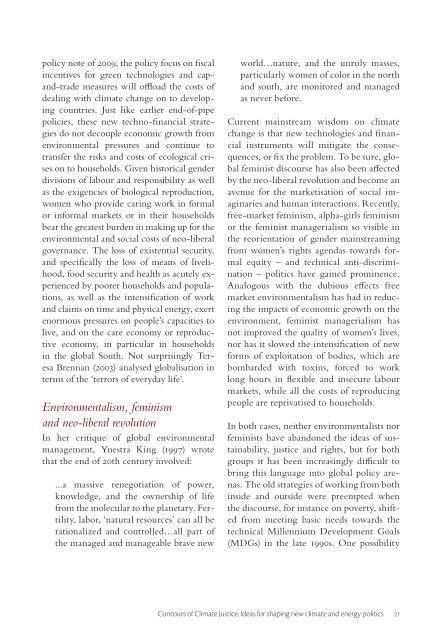Contours of Climate Justice - Dag Hammarskjöld Foundation
Contours of Climate Justice - Dag Hammarskjöld Foundation
Contours of Climate Justice - Dag Hammarskjöld Foundation
Create successful ePaper yourself
Turn your PDF publications into a flip-book with our unique Google optimized e-Paper software.
policy note <strong>of</strong> 2009, the policy focus on fi scal<br />
incentives for green technologies and capand-trade<br />
measures will <strong>of</strong>fl oad the costs <strong>of</strong><br />
dealing with climate change on to developing<br />
countries. Just like earlier end-<strong>of</strong>-pipe<br />
policies, these new techno-fi nancial strategies<br />
do not decouple economic growth from<br />
environmental pressures and continue to<br />
transfer the risks and costs <strong>of</strong> ecological crises<br />
on to households. Given historical gender<br />
divisions <strong>of</strong> labour and responsibility as well<br />
as the exigencies <strong>of</strong> biological reproduction,<br />
women who provide caring work in formal<br />
or informal markets or in their households<br />
bear the greatest burden in making up for the<br />
environmental and social costs <strong>of</strong> neo-liberal<br />
governance. The loss <strong>of</strong> existential security,<br />
and specifi cally the loss <strong>of</strong> means <strong>of</strong> livelihood,<br />
food security and health as acutely experienced<br />
by poorer households and populations,<br />
as well as the intensifi cation <strong>of</strong> work<br />
and claims on time and physical energy, exert<br />
enormous pressures on people’s capacities to<br />
live, and on the care economy or reproductive<br />
economy, in particular in households<br />
in the global South. Not surprisingly Teresa<br />
Brennan (2003) analysed globalisation in<br />
terms <strong>of</strong> the ‘terrors <strong>of</strong> everyday life’.<br />
Environmentalism, feminism<br />
and neo-liberal revolution<br />
In her critique <strong>of</strong> global environmental<br />
management, Ynestra King (1997) wrote<br />
that the end <strong>of</strong> 20th century involved:<br />
...a massive renegotiation <strong>of</strong> power,<br />
knowledge, and the ownership <strong>of</strong> life<br />
from the molecular to the planetary. Fertility,<br />
labor, ‘natural resources’ can all be<br />
rationalized and controlled…all part <strong>of</strong><br />
the managed and manageable brave new<br />
world…nature, and the unruly masses,<br />
particularly women <strong>of</strong> color in the north<br />
and south, are monitored and managed<br />
as never before.<br />
Current mainstream wisdom on climate<br />
change is that new technologies and fi nancial<br />
instruments will mitigate the consequences,<br />
or fi x the problem. To be sure, global<br />
feminist discourse has also been aff ected<br />
by the neo-liberal revolution and become an<br />
avenue for the marketisation <strong>of</strong> social imaginaries<br />
and human interactions. Recently,<br />
free-market feminism, alpha-girls feminism<br />
or the feminist managerialism so visible in<br />
the reorientation <strong>of</strong> gender mainstreaming<br />
from women’s rights agendas towards formal<br />
equity – and technical anti-discrimination<br />
– politics have gained prominence.<br />
Analogous with the dubious eff ects free<br />
market environmentalism has had in reducing<br />
the impacts <strong>of</strong> economic growth on the<br />
environment, feminist managerialism has<br />
not improved the quality <strong>of</strong> women’s lives,<br />
nor has it slowed the intensifi cation <strong>of</strong> new<br />
forms <strong>of</strong> exploitation <strong>of</strong> bodies, which are<br />
bombarded with toxins, forced to work<br />
long hours in fl exible and insecure labour<br />
markets, while all the costs <strong>of</strong> reproducing<br />
people are reprivatised to households.<br />
In both cases, neither environmentalists nor<br />
feminists have abandoned the ideas <strong>of</strong> sustainability,<br />
justice and rights, but for both<br />
groups it has been increasingly diffi cult to<br />
bring this language into global policy arenas.<br />
The old strategies <strong>of</strong> working from both<br />
inside and outside were preempted when<br />
the discourse, for instance on poverty, shifted<br />
from meeting basic needs towards the<br />
technical Millennium Development Goals<br />
(MDGs) in the late 1990s. One possibility<br />
<strong>Contours</strong> <strong>of</strong> <strong>Climate</strong> <strong>Justice</strong>. Ideas for shaping new climate and energy politics 21
















